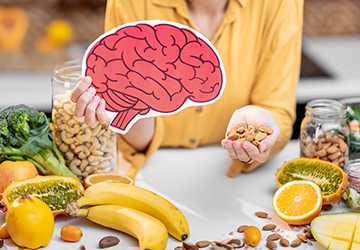The intricate connection between nutrition and mental health is an increasingly recognized aspect of overall well-being. The food we consume doesn't just impact our physical health; it also plays a crucial role in our mental and emotional states. Understanding the link between nutrition and mental health is essential for adopting a holistic approach to self-care. In this exploration, we delve into what you should know about the intricate relationship between nutrition and mental well-being.

1. Nutrients and Brain Function:
The brain is a highly metabolically active organ that requires constant nutrients to function optimally. Essential nutrients are vital in neurotransmitter production, energy metabolism, and overall neural health.
Essential nutrients for brain health:
● Omega-3 fatty acids: Fish, flaxseeds, and walnuts, rich in fat, contain Omega-3 fatty acids crucial for brain structure and function.
● Antioxidants: Fruits and vegetables rich in antioxidants, such as berries and leafy greens, help protect the brain from oxidative stress.
● B-vitamins: Essential for neurotransmitter synthesis, B-vitamins are found in whole grains, leafy greens, and legumes.
2. Gut-Brain Axis:
The gut and the brain are interconnected through the gut-brain axis, a bidirectional communication system. The health of the gut microbiota, comprised of trillions of microorganisms, influences mental health by modulating inflammation, neurotransmitter production, and even behaviour.
Ways to support a healthy gut:
● Probiotics: Consuming fermented foods like yoghurt, kefir, and kimchi introduces beneficial bacteria to the gut.
● Fiber-rich foods: Whole grains, legumes, and fruits provide prebiotics that nourish gut bacteria.
● Limiting processed foods: A diet high in processed foods can negatively impact gut health.
3. Inflammation and Mental Health:
Chronic inflammation has been linked to various mental health conditions, including depression and anxiety. Nutrition is pivotal in modulating inflammation, with certain foods exacerbating or mitigating inflammatory responses.
Anti-inflammatory foods:
● Fatty fish: Rich in omega-3s, fish like salmon and mackerel have anti-inflammatory properties.
● Turmeric: The active compound in turmeric, curcumin, has potent anti-inflammatory effects.
● Colorful fruits and vegetables: Berries, tomatoes, and leafy greens contain antioxidants that combat inflammation.
4. Impact of Sugar and Processed Foods:
High sugar and processed food intake has been associated with an increased risk of mental health issues. These foods can lead to rapid blood sugar spikes and crashes, affecting mood, energy levels, and cognitive function.
Ways to reduce sugar and processed food intake:
● Read food labels: Be mindful of added sugars in processed foods.
● Choose whole foods: Opt for whole grains, lean proteins, fruits, and vegetables instead of heavily processed options.
● Limit sugary beverages: Reduce sodas, energy drinks, and juices consumption.
5. Micronutrient Deficiencies and Mental Health:
Deficiencies in specific vitamins and minerals can impact mental health. For example, inadequate levels of vitamin D, vitamin B12, and iron have been linked to conditions such as depression and fatigue.
Sources of critical nutrients for mental health:
● Vitamin D: Sun exposure, fatty fish, and fortified foods.
● Vitamin B12: Meat, fish, eggs, and dairy products.
● Iron: Lean meats, beans, lentils, and leafy greens.
6. Role of Protein in Neurotransmitter Production:
Proteins are crucial for synthesizing neurotransmitters, chemical messengers that facilitate communication between nerve cells. Amino acids, the building blocks of proteins, play specific roles in neurotransmitter production.
Protein-rich foods:
● Lean meats: Chicken, turkey, and fish are excellent sources of high-quality protein.
● Plant-based proteins: Legumes, tofu, and quinoa provide protein for those following a vegetarian or vegan diet.
● Dairy products: Milk, yoghurt, and cheese increase protein intake.
7. Complex Carbohydrates and Serotonin Production:
Complex carbohydrates play a role in serotonin production, a neurotransmitter associated with mood regulation and feelings of well-being. Consuming whole grains, legumes, and vegetables can contribute to stable serotonin levels.
Sources of complex carbohydrates:
● Whole grains: Brown rice, quinoa, oats, and whole wheat products.
● Legumes: Lentils, chickpeas, and black beans are rich in complex carbohydrates and fibre.
● Vegetables: Nutrient sources include broccoli, sweet potatoes, and leafy greens.
8. Hydration and Cognitive Function:
Dehydration can impact cognitive function, leading to feelings of fatigue and difficulty concentrating. Maintaining adequate hydration supports overall brain health and mental performance.
Tips for staying hydrated:
● Drink water regularly: Aim for at least eight glasses (64 ounces) of water daily.
● Consume hydrating foods: Fruits with high water content, such as watermelon and cucumber, contribute to hydration.
9. Individual Variability and Personalized Nutrition:
It's essential to recognize that individuals may respond differently to various dietary patterns. Personalized nutrition considers genetics, metabolism, and lifestyle factors to tailor nutritional recommendations for optimal mental health.
Considerations for personalized nutrition:
● Genetic testing: Some individuals may benefit from genetic testing to understand how their bodies metabolize certain nutrients.
Lifestyle factors: Consider individual variations in lifestyle, activity level, and stress levels when designing personalized nutrition plans.
10. Mindful Eating for Mental Well-Being:
Practicing mindful eating involves being present and attentive during meals, which can positively impact mental well-being. It encourages a healthy relationship with food, promoting enjoyment and satisfaction.

Mindful eating practices:
● Savor each bite: Consider flavours, textures, and aromas.
● Eat without distractions: Minimize electronic devices and other distractions during meals.
● Listen to hunger and fullness cues: Tune into your body's signals for hunger and satisfaction.
11. Impact of Caffeine and Alcohol:
While moderate consumption of caffeine and alcohol is generally considered safe for many individuals, excessive intake can negatively impact mental health. Both substances can disrupt sleep patterns and contribute to anxiety or mood swings.
Moderation and mindful consumption:
● Limit caffeine intake: Be mindful of the timing and quantity of caffeinated beverages, especially in the afternoon and evening.
● Moderate alcohol consumption: If consuming alcohol, do so in moderation and be aware of its potential impact on sleep and mood.
12. Nutrition and Mental Health Across the Lifespan:
The link between nutrition and mental health is relevant at every stage of life. From prenatal nutrition influencing fetal brain development to nutrition in older adults supporting cognitive function, the impact of food choices is lifelong.
Critical considerations at different life stages:
● Prenatal nutrition: Adequate intake of nutrients like folate and omega-3s is crucial for fetal brain development.
● Childhood nutrition: A balanced diet supports children's cognitive development and mental well-being.
● Adolescent nutrition: Nutrient-rich foods contribute to stable mood and adolescent energy levels.
● Adult and senior nutrition: A varied and nutrient-dense diet is essential for maintaining cognitive function as individuals age.
13. Seeking Professional Guidance for Mental Health and Nutrition:
For individuals dealing with mental health challenges or specific dietary needs, seeking professional guidance is crucial. Registered dietitians, nutritionists, and mental health professionals can collaborate to develop comprehensive nutritional and psychological strategies.
When to seek professional guidance:
● Mental health concerns: If you are experiencing symptoms of anxiety, depression, or other mental health conditions.
● Nutrient deficiencies: When diagnosed with deficiencies that may impact mental well-being.
● Complex dietary needs: Individuals with specific dietary requirements due to health conditions or lifestyle choices.
14. Building a Sustainable and Enjoyable Approach:
Creating a sustainable and enjoyable approach to nutrition is vital to long-term success. Restrictive diets or extreme approaches may not be maintainable, and finding a balance that aligns with individual preferences and lifestyles is essential.
Tips for building a sustainable approach:
● Variety and balance: Include a diverse range of foods to ensure a variety of nutrients.
● Flexibility: Allow for occasional indulgences and flexibility in dietary choices.
● Enjoyment: Choose foods that bring pleasure and satisfaction, promoting a positive relationship with food.
15. Community and Social Support:
Engaging in a supportive community or seeking social support can positively impact mental health and nutrition. Sharing experiences, exchanging recipes, and learning from others can enhance motivation and create a connection.
Ways to foster community support:
● Join cooking or nutrition classes: Participate in classes that promote healthy cooking and nutrition.
● Online communities: Connect with online groups or forums focused on nutrition and mental well-being.
● Family and friends: Share healthy meals and experiences with friends and family.
Conclusion:
The link between nutrition and mental health is a dynamic and multifaceted relationship that continues to be explored and understood. Recognizing the profound impact of food choices on mental well-being empowers individuals to make informed decisions that contribute to overall health. Whether through nutrient-rich foods, mindful eating practices, or personalized nutrition plans, adopting a holistic approach to nutrition can be a powerful tool in promoting mental health. As research advances, integrating nutrition principles into mental health care becomes increasingly important, emphasizing the interconnectedness of physical and psychological well-being in pursuing a healthier and more fulfilling life.



